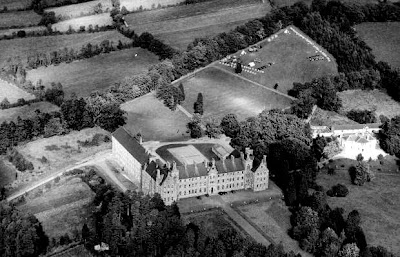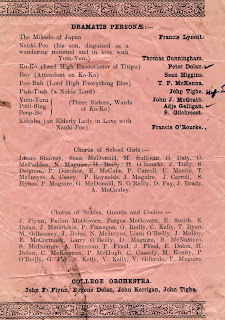 |
| St.Patrick's College, Cavan |
Remembering St.Pat's ..
In September 1942 TP was sent as a boarder to St.Patrick's College, Cavan. These are times he remembers with a mix of emotions. The Second World War was in full swing and while the Irish Republic maintained a neutral stance it was still badly affected by food and fuel shortages. The upshot of these for the young boarders was a meagre diet and freezing dormitories.
A sense of despondency ..
There were other pressures too, as TP recalls: "If my father ever made a mistake it was that he made me feel that this was an enormous big deal and they were making great sacrifices. I felt a great responsibility and collapsed under it. The end result was that I wouldn't study. I spent my study periods reading poetry and English literature. I used to sit up in my room late at night looking out into the dark with a sense of despondency."
Despite that gloomy prognosis, St.Pat's would provide the introduction to a key figure in the development of this serious young man. TP takes up the story:
Fr. Vincent Kennedy ..
"Unquestionably, the biggest influence in my life was Father Vincent Kennedy. Looking back, having met many, many eminent people, he was really one of the most sophisticated men I ever met. He was a very stylish man. He was small and dapper and everything he did was very graceful. He had a rather lovely room in Saint Patrick's College, with a Bechstein piano and a very nice library.
"Unquestionably, the biggest influence in my life was Father Vincent Kennedy. Looking back, having met many, many eminent people, he was really one of the most sophisticated men I ever met. He was a very stylish man. He was small and dapper and everything he did was very graceful. He had a rather lovely room in Saint Patrick's College, with a Bechstein piano and a very nice library.
 |
"He used to produce operas. I was a boy soprano. My first appearance was in The Yeoman of the Guard. I had an extraordinarily powerful boy sporano voice, something I inherited from my father. When my voice broke, we used to go up to Father Vincents' room and he would play us a wide variety of music. He would demonstrate the difference in structure between Beethoven and Chopin, for example, and the development of the piano as an instrument.
Following the Score ..
"This was very, very fascinating and unusual for a secondary school. We would listen to the Proms on BBC in his room and follow it with the score. He had a wonderful range as a classical pianist. He could play the Grieg Concerto from memory and he had hundreds of scores as well.
Creme de la Creme ..
"We were the chosen few - just three or four of us - like Jean Brodie's creme de la creme. We would knock on his door afer night prayer and if he was in a good mood he'd let us in. We would have coffee and talk and he would play the piano. If he was in a bad mood, he would just sit there and puff smoke in the air very elegantly. I remember one Leitrim fellow saying to him, 'Are you bored, Father?' There was a long pause. 'Haven't I the right to be bored in my own sitting-room?' We had the good sense to get up and leave.
Meeting McMaster ..
"I had moved on from Gilbert & Sullivan and into drama: the plays of Louis D'Alton for example. I had got the acting bug as young as the age of fifteen. Anew McMaster was visiting Cavan and he had brought his usual repertoire of Shakespeare. We saw Hamlet and Macbeth and Father Kennedy then brought us backstage to meet McMaster. Myself and another chap decided to go down and talk to him in The Farnham Arms. He was very nice and bought us tea. He said, 'Don't be an actor, my dear boy, until you are absolutely sure there's nothing else in the world you can do.'
"This was very, very fascinating and unusual for a secondary school. We would listen to the Proms on BBC in his room and follow it with the score. He had a wonderful range as a classical pianist. He could play the Grieg Concerto from memory and he had hundreds of scores as well.
Creme de la Creme ..
"We were the chosen few - just three or four of us - like Jean Brodie's creme de la creme. We would knock on his door afer night prayer and if he was in a good mood he'd let us in. We would have coffee and talk and he would play the piano. If he was in a bad mood, he would just sit there and puff smoke in the air very elegantly. I remember one Leitrim fellow saying to him, 'Are you bored, Father?' There was a long pause. 'Haven't I the right to be bored in my own sitting-room?' We had the good sense to get up and leave.
 |
| Anew McMaster as Othello |
"I had moved on from Gilbert & Sullivan and into drama: the plays of Louis D'Alton for example. I had got the acting bug as young as the age of fifteen. Anew McMaster was visiting Cavan and he had brought his usual repertoire of Shakespeare. We saw Hamlet and Macbeth and Father Kennedy then brought us backstage to meet McMaster. Myself and another chap decided to go down and talk to him in The Farnham Arms. He was very nice and bought us tea. He said, 'Don't be an actor, my dear boy, until you are absolutely sure there's nothing else in the world you can do.'










.jpg)
.jpg)









.jpg)
.jpg)
.jpg)


.jpg)
.jpg)
.jpg)



























